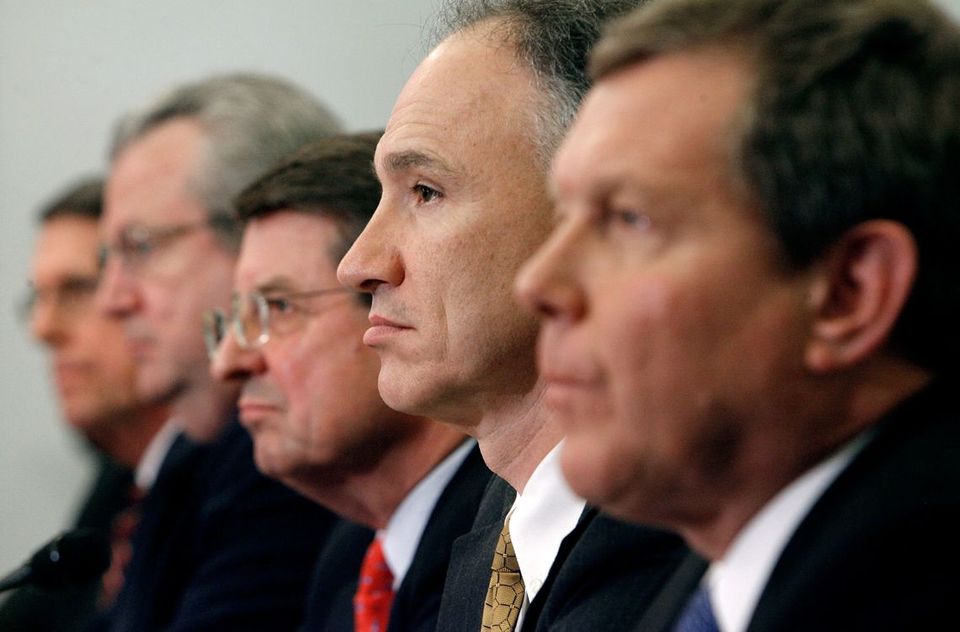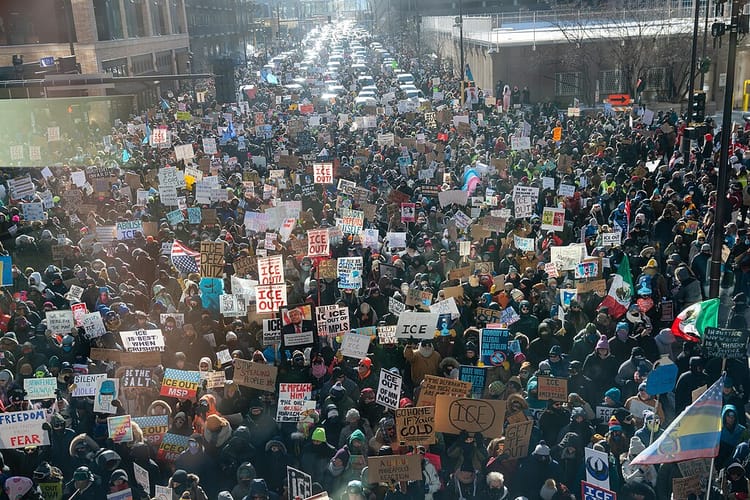Accountability Is The Most Important Climate Solution

In December 2022, the House Oversight Committee published a second round of documents received in response to subpoenas issued as part of its investigation into climate disinformation. You can read my analysis of those documents—both batches, all 1500-ish pages of them—over at The Intercept, but I want to draw your attention today to the investigation itself and what it tells us about the need for climate accountability.
House Oversight Committee chair Rep Carolyn Maloney (D-NY) and chair of the Oversight and Reform Subcommittee on the Environment Ro Khanna (D-CA) opened their investigation into the fossil fuel industry's disinformation on the climate crisis in September 2021. They requested various documents, and asked that the CEOs of five top oil companies, as well as the American Petroleum Institute and U.S. Chamber of Commerce, testify before the Committee. The following month, at an Oversight Committee Hearing, some of those executives did indeed testify, but none had complied fully with the Committee's request for documents, so Rep Maloney announced at that hearing that she would subpoena the withheld documents. Since the start of the investigation the Committee has received around a million documents, but has not had the staff resources to comb through them all or to redact and publish all of the documents that seem important for both policymakers and the public to be aware of.
Given the fact that Congress will be changing hands tomorrow, it would behoove the Committee to release those documents today, either to the Senate or to a government agency with the authority and resources to do something with them. And, according to Rep Khanna, on the record to me on December 12, that was the plan. Other staffers have since confirmed that to me on background. But for some reason the Oversight Committee has reversed itself on that decision. Rep Maloney has not asked Committee staff to release the documents. So, while Committee staffers have told me on background that the investigation will continue...it's hard to see how exactly that will happen without approval from Republican leadership, which they are unlikely to get.
There are still some ways for other branches of government to get hold of these documents. The Senate could request them directly, for example, and there's been some talk of Senator Sheldon Whitehouse doing so. Letters could be sent to various Senate leaders and Biden administration leaders asking them to carry on the investigation. In fact, such letters have already been drafted and can be sent at any time. But the easiest move by far would be for the Oversight Committee to pass the baton. It's not something that's typically done, in fact it's far more typical for House committees to be territorial about investigations like these, but these are unprecedented times and this is a groundbreaking investigation that's working against a clock that has absolutely nothing to do with D.C. politics. We can't wait two years or more for the Committee to pick this investigation back up. This investigation needs to move forward and be completed because it holds the key to a necessary first step on climate that we have yet to take: accountability.
Whenever I talk about accountability a certain type of well-bred elitist tends to bristle. There's no need to blame, they say, or point fingers. Singling out villains is backwards, archaic, it smacks of eye-for-an-eye approaches to justice and it lets everyone else off the hook. This is a fundamental misunderstanding of accountability and the critical role it plays in formulating effective solutions.
Catastrophic climate change is a symptom of an intertwined web of problems. Untangling that web and the various forces that created it is not just a worthy exercise, it’s absolutely critical to developing solutions that actually work. The focus on technological and policy solutions to climate has put the cart before the horse, and in doing so, created a solutions framework that is hopelessly inadequate. Americans in particular have a tendency to skip right over accountability and straight to "solutions," but failing to understand how a problem came about in the first place tends to deliver…not solutions, but new problems. And on climate, examples of that abound.
People talk about “the energy transition” as an aspirational, future phase, for example, which ignores the fact that we’ve just spent the past 20 years living through an energy transition, one that required major investments in infrastructure, a new distribution system, all of that. The conversion of U.S. energy sources from coal to natural gas was a massive transition, on par with the transition currently being proposed from fossil fuels to renewables. But we don’t often talk about it that way, which means we miss key lessons from that transition: simply swapping in one energy source for another, focusing on only one greenhouse gas, and allowing the fossil fuel industry to drive and manage that transition were all enormous missteps. In the past five years, study after study has come out revealing under-explored impacts of natural gas, from the global warming potential of methane to the more immediate impacts of the stuff on air pollution (both indoor and outdoor), but the fossil fuel industry—having invested heavily in the shift to gas—is fighting against any move away from it.
The documents published so far by the House Oversight Committee show an industry hell-bent on more of the same pushing another "solution" that will lock in fossil fuel development, infrastructure, and, thus, profits for decades to come: carbon capture. In a 2017 document outlining the potential for CCS on the Gulf Coast, Shell notes that “the window for CCS to remain relevant with governments and society is closing quickly and action needs to occur within the next decade.”
The industry wants to see so much government funding for CCS locked in that there’s no choice but to continue down that path. And the purpose is clear: enabling the continued burning of fossil fuels. “The value of CCS to Shell is the ability to decarbonize our products,” the document explains. CCS will also help Shell to “retain a larger market share for our products in the energy transition, in addition to reputational value.”
The documents also show how the industry is going about getting universities and environmental NGOs to aid it in the push for carbon capture. It’s important to remember that environmental groups were big proponents of natural gas in the past, too. The Sierra Club famously touted natural gas as a “bridge fuel” to renewables, a campaign funded in part by $25 million from early fracking pioneer Chesapeake Energy. Moving away from coal was an improvement, and natural gas did help grow the country’s renewable energy sources, but the cost of those advancements was poorly understood and even more poorly communicated. And those lessons still haven’t been learned. The fossil fuel industry is still touting gas as a necessary component of the renewable transition, while actively fighting the "transition" part. Many climate advocates still focus their attention solely on energy sources, policy proposals are still focused largely on carbon dioxide alone , and it’s still common to hear politicians and environmental advocates suggest that the fossil industry should manage the transition away from its core product (please point me to any point in the history of capitalism where that particular magic trick has been pulled off!)
Natural gas and carbon capture are not the only examples of climate solutions being proposed without any understanding of how the problem was created in the first place. Let’s talk about biomass, shall we? Like natural gas, biomass was initially embraced by large environmental groups—the idea of using waste to generate energy has always held enormous appeal, particularly for the generation that fell in love with recycling as an environmental solution. In less than a decade, environmentalists realized that in most instances biomass was a boondoggle, but the horse was out of the proverbial barn. Several European countries today include biomass as part of their progress toward “net zero” emissions targets, using accounting methods that somehow leave out the emissions associated with shipping wood pellets from the U.S. to Europe. Meanwhile, a 2021 Harvard study found that biomass has now surpassed coal as the primary residential contributor to air pollution.
Awareness is slowly increasing about the as-yet-unaccounted-for environmental impact of the impending electric vehicle boom, too. What might happen when lithium becomes the new petroleum? Or batteries the new fracking water? Which species and communities are we willing to decimate for a “greener” energy source?
What these solutions leave out are power structures, and who is afforded the luxury of choice within them. So instead of thinking about how we can equitably get people from Point A to Point B, the focus is on how we maintain the status quo while reducing greenhouse gas emissions. Instead of figuring out how exactly a problem as solvable as climate change became an existential threat in the first place, we continue to come up with new “solutions” in the exact same decision-making framework.
Today is the House Committee's last chance to release the documents gleaned from its investigation to the Senate. Passing them on shows the public that the investigation was not a PR move or politics as usual, that it is about understanding and addressing the role of major actors in an ongoing catastrophe and innoculating key policy processes and information ecosystems from more of the same.
On climate, accountability isn’t about pointing fingers or assigning blame, it’s a necessary accounting of how we got here in the first place, which is absolutely critical to actually solving the problem. It's a step we skip over at our peril.





